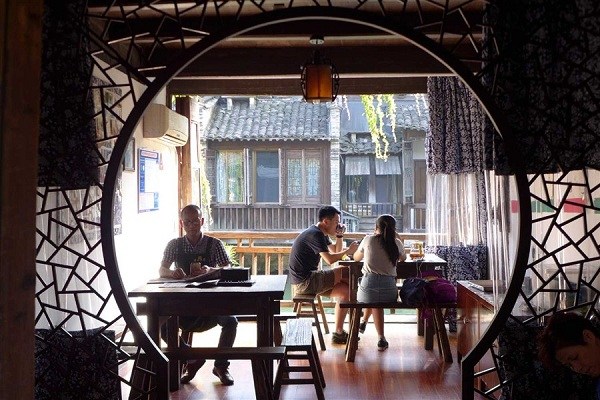Wuzhen sets the stage for countryside tourism
 0 Comment(s)
0 Comment(s) Print
Print E-mail Shanghai Daily, October 27, 2016
E-mail Shanghai Daily, October 27, 2016
|
|
|
Tourists enjoy a meal in a distinctive waterside restaurant in Wuzhen.(Wang Rongjiang) |
Once sleepy villages beyond the urban fringe have become the vanguard of art and culture as they reinvent themselves as getaway havens for city dwellers keen to escape crowds, noise and stress for culture in a rural setting.
Visitors not only find tranquility amid the timeless whitewashed walls, green pastures and simpler lifestyle of villages. Nowadays, they also find theater, music and art festivals set against the backdrop of ancient canal towns, hills or idyllic pastoral areas.
"Many Chinese villages, especially those located in the same general region, are quite identical to one another in terms of history, setting and heritage," says Eddie Chang, director of Shanghai Gengliang Tourism Firm, which specializes in trips to the countryside. "It's difficult for any one village to stand out from the pack."
But that's exactly what many towns are trying to do. To differentiate themselves, many villages are adopting what might be called "value-added" mode, initiating music, arts and drama festivals to attract visitors.
"The festival is a great way to create uniqueness," Chang says. "The modern ambience of drama, art or music set against the backdrop of ancient architecture is compelling. Guests can enjoy a festival and cultural heritage in the same place."
The Midi Festival, a music fest that started 14 years ago in the canteen of a Beijing music school, has evolved into franchise events in small, lesser-known towns. The festival staging is often timed to coincide with long weekends or national holidays.
Some young people compare the music events to classics like Woodstock or the Glastonbury Festival in the UK, where music lovers come from far and wide to camp out, socialize and listen to bands.
This year so far, Midi Festival has been staged three times -- in Qidu Town of Suzhou and Tenglong Cave Scenic Area of Hubei -- with different artists.






